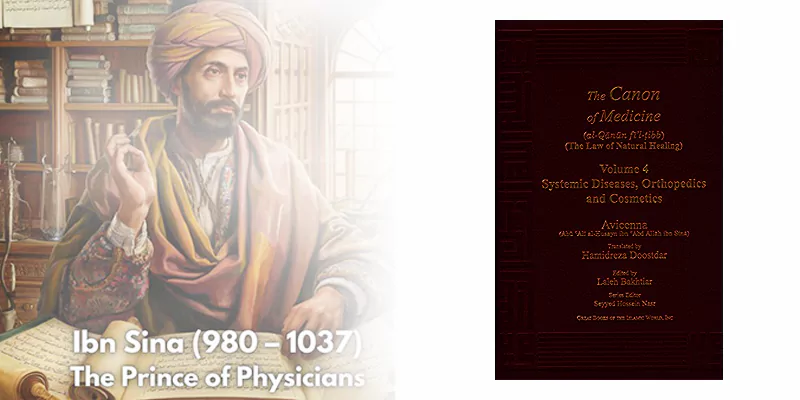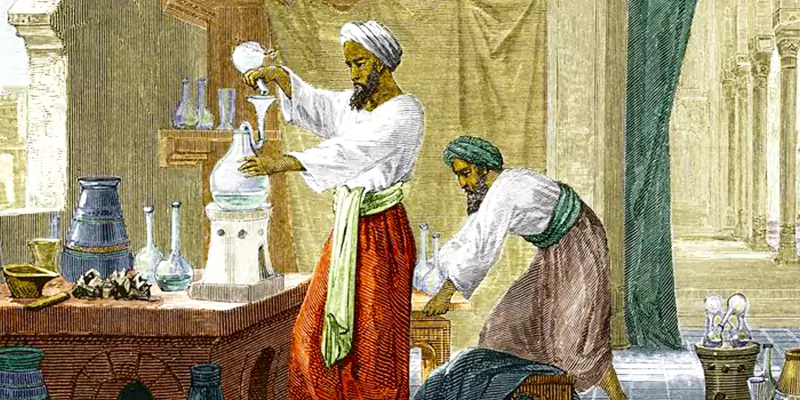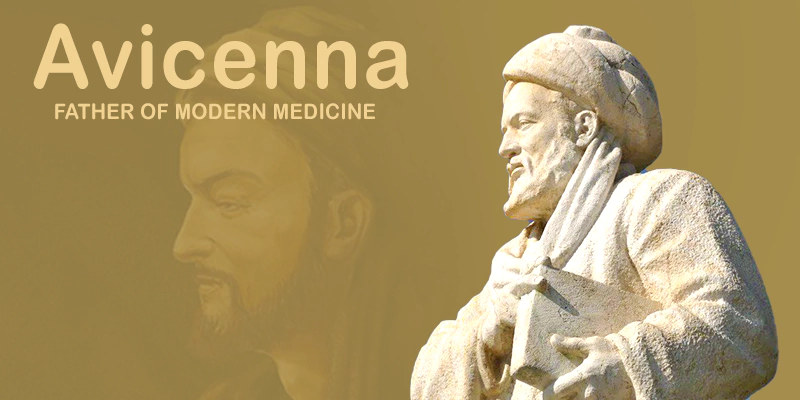- Parisa Adhami
- information
- 469 views
- 0 comments
One of the most important philosophers, scientists, and doctors in history are Abu Ali al-Husayn ibn Abdullah ibn Sina, who is called Abu Ali Sina. In the West, he is popularly known as Avicenna. Avicenna was born in Afshana, near Bukhara, in modern-day Uzbekistan, and died in Hamadan, Iran.
He has helped knowledge to go beyond the bounds of the Islamic world. His contributions to physics, mathematics, astronomy, philosophy, and medicine established the foundation for emerging sciences. According to some accounts, Omar Khayyam was a student of Avicenna, and this fact is evident in some of Khayyam's treatises. In addition to revolutionizing medical knowledge in the Islamic world during the Middle Ages, Avicenna's most famous work, "The Canon Medicine," was a main for European medical schools for many centuries. The life of Avicenna, his role in philosophy and medicine, his scientific process, and his major effect on both the Islamic and European worlds will all be covered in this article.
Table Of Content
Early Life of Abu Ali Sina
In what is now Uzbekistan, Abu Ali Sina was born in the village of Afshana, close to Bukhara, the Samanid Empire's capital. He was raised in a creative family; his father, Abdullah, held an important position in the Samanid authorities. From an early age, Avicenna showed a significant innate talent for learning. Regarding religion, In Iran, people pursued Zoroastrianism God in Zoroastrian religion; his primary focus was on harmonizing Greek philosophy with Islamic thought. By age ten, He studied literature, theology, and the natural sciences and committed the Quran to memory.
His interest in medicine quickly changed. Avicenna started practicing medicine at sixteen and soon became a talented doctor. Nuh ibn Mansur, the Samanid leader, was drawn to his skill, and he successfully treated him for a disease that disappointed other medical professionals. As a result, Avicenna could access the ruler's massive royal library, which increased his understanding of subjects like philosophy, medicine, and the natural sciences.
Here is more detailed information about the "Persian Empire" and everything you would like to know about it.
The works of Avicenna
Avicenna's works are deeply concerned with science, philosophy, and medicine, and the world of science and knowledge has changed in many ways. Here, you can find detailed information about his works and achievements, which play important roles worldwide.
Cyrus Crafts; Luxury & Unique Products
Ibn Sina's Famous Book "The Canon of Medicine"
"The Canon of Medicine" is Abu Ali Sina's most famous and helpful work. It was a vast encyclopedia of medical knowledge written in Arabic, the language of science in the Islamic world at the time. In addition to Persian, Indian, and Islamic medical traditions, it drew from earlier Greek and Roman sources, including the scriptures of Galen and Hippocrates.
They divided "The Canon of Medicine" into five books. The properties of medicine were covered in the second book, while general medical principles and anatomy were covered in the first. The treatment of diseases that target particular organs was covered in the third book, while diseases that impact the entire body were the subject of the fourth book. A pharmacopeia of compound remedies was presented in the fifth and last book.
The Canon's logical and systematic organization of medical knowledge was one of its most notable aspects. Avicenna rejected superstition and unproven drugs to treat in favor of diagnosis based on experience and observation. Many of his thorough explanations of different illnesses, their signs, and potential cures were still taught in medical schools well into the Renaissance.
Avicenna was well ahead of his time regarding his knowledge of bacterial infections, the circulatory system, and mental health. For a long time, "The Canon of Medicine" was a key text in Islamic and European countries. It became a basic necessity in European medical schools during the Middle Ages after being translated into Latin in the 12th century. The fact that some European universities were still using it in the 17th century shows how timeless and comprehensive Avicenna's medical knowledge was.

Aveicina's Work on Logic and Metaphysics
In addition to his contributions to medicine, Avicenna's philosophical writings had a massive impact on Islamic and Western philosophy. He made major contributions to logic, moral philosophy, and metaphysics. Although Avicenna built upon Aristotle's writings to create his philosophical system, they strongly influenced him, particularly his rational and metaphysical works.
The Distinction between Essence and Existence in Aveicina's Mind
Avicenna's idea of the difference between existence and essence is arguably his most well-known contribution. He maintained that everything that exists has both an existence (that something is) and an essence (what something is) in his metaphysical framework. For example, the essence of a horse is its "horseness," but for that essence to be expressed in the physical world, the horse must exist.
This distinction prompted Avicenna's further philosophical argument concerning the nature of God. Since God's essence is existence itself, he suggested that God is the only being whose existence and essence are the same and that God must exist by necessity. Since God created everything else in the universe, its existence is consistent rather than necessary. Thomas Aquinas and other Western medieval philosophers adopted this argument, significantly impacting later Islamic theology.
The Flying Man Thought Experiment of Aceicina
Avicenna investigated the nature of human consciousness in the "Flying Man," one of his most well-known thought experiments. In his question, he asked the audience to picture a fully developed human being suspended in midair without any senses of sight, sound, touch, or smell. Avicenna maintained that this "Flying Man" would still be conscious of his existence through pure self-awareness, even without all sensory input. One of the first attempts to explain the idea of the soul existing independently of the body was this thought experiment, which was crucial to discussions of self-consciousness in Islamic and Western philosophy.
Scientific and Mathematical Contributions of Ibn Sina
Avicenna made important contributions to mathematics, astronomy, physics, medicine, and philosophy. His scientific writings demonstrated a dedication to empirical research, adhering to strict observation, experimentation, and logical analysis methodologies.

You can find detailed information about Maryam Mirzakhani, the Persian Star of Mathematics, and his life here.
Physics and Natural Philosophy of Aveicina
Avicenna's accomplishments, especially his study of movement and mechanics, made later advancements in physics possible. He popularized "motivation," which pioneered contemporary notions of momentum and uncertainty. Avicenna's study of force and motion implied numerous ideas that would later be improved upon during the European Scientific Revolution.
Avicenna helped astronomers create models that explained how planets moved. Avicenna made important observations that called into question elements of the geocentric model despite working within the Ptolemaic system, which positioned the Earth at the center of the universe. In the contemporary age, Firuz Naderi is among the most famous people who have collaborated with NASA and managed Mars exploration programs; they play an important role in this area.
Ibn Sina was among the first to propose that the celestial bodies were physical objects governed by natural laws rather than divine entities. This opened the door for later astronomers like Copernicus and Galileo to contest the Earth-centered conception of the universe.
Aveicina's Contribution to Mathematics and Logic
Based on the work of earlier Islamic mathematicians, Avicenna contributed to geometry and number theory in mathematics. His writings on the philosophy of mathematics impacted later academics in both the Islamic and European worlds. He was also very interested in the logical structures that supported mathematical reasoning.
The Influence of Aveicina on Islamic and Western Thought
Additionally, Avicenna's contributions to logic were revolutionary. He improved on Aristotle's syllogistic reasoning and expanded the use of logic to include new fields of study. His work on logic, which was taught as a major subject in Islamic madrasas (schools), influenced the Islamic Golden Age's intellectual culture. The philosophical system of Avicenna, commonly known as "Avicennism," had a substantial influence on subsequent Islamic thinkers such as Ibn Rushd (Averroes) and Al-Ghazali.
Latin translations of Avicenna's writings, especially his "Metaphysics" and "The Healing" (Al-Shifa), a thorough philosophical encyclopedia, were instrumental in popularizing his ideas throughout Europe. Important medieval thinkers like Thomas Aquinas and Albertus Magnus were influenced by his writings and adopted Avicenna's theories into Scholastic philosophy and Christian theology.
Avicenna's Legacy in the Islamic World and Europe
Avicenna's writings were studied and highly regarded throughout the Islamic world, and his influence grew even after his passing. He was hailed as a national hero in Persia, and his name came to represent knowledge and brilliance. From Persia to Andalusia, madrasas and universities throughout the Islamic world taught his writings. During the 12th century, Avicenna's writings were translated into Latin in Europe as part of a larger effort to translate Islamic philosophical and scientific writings into European languages.
By reintroducing the lost writings of Aristotle and other ancient Greek philosophers through the analysis and interpretations of Islamic scholars like Avicenna, this translation movement—focused in places like Toledo and Sicily—helped awaken European Development. He had a major effect on medieval European thought, especially in philosophy and medicine.
The renowned Christian theologian Thomas Aquinas produced Christian doctrine and Aristotelian philosophy, incorporating many of Avicenna's metaphysical ideas. Avicenna's status as one of the most important figures in medical history was further marked by his medical writings, which have been a mainstay of European medical education for centuries.
Last Words of Cyruscrafts on Ibn Sina
Avicenna, also known as Abu Ali Sina, was a powerful member of the Islamic Golden Age and later intellectual history. His achievements in the natural sciences, philosophy, and medicine influenced the intellectual culture of medieval Europe and the Islamic world. His "Canon of Medicine" provided a standard medical textbook for centuries, and his philosophical writings significantly influenced Christian and Islamic intellectuals. Avicenna was a true polymath whose influence can still be seen in modern philosophy and science thanks to his exacting scientific methods based on observation, experimentation, and logical reasoning.
At Cyruscrafts, you can read about Iranian and non-Iranian celebrities and learn about their biographies and works. Various quality products are ready to be shipped worldwide, and you can search for any category you want and choose your product according to your taste. Our drop shipping company, Cyruscrafts, located in Canada Ontario, is ready to respond to you and send your order as quickly as possible.











Comments (0)